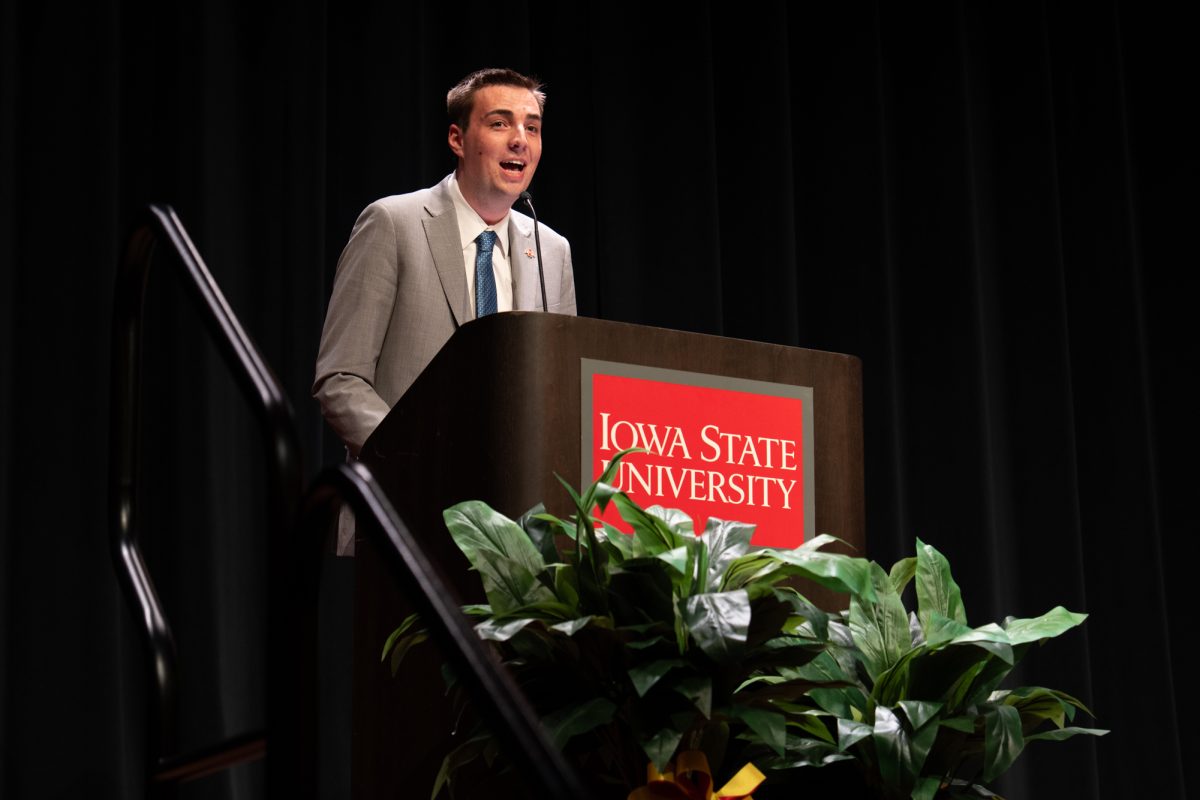Housing workshop highlights occupancy issues in Ames, solution sought
Ames landlord Al Warren (standing), address a panel consisting of city leaders during a housing workshop Thursday evening aiming to address a new option for a occupancy ordinance for the city.
August 17, 2017
Ames landlords encouraged city leaders Thursday evening to be more hesitant before adopting an ordinance that might restrict regulating occupancy until seeing the full impact of an Iowa law passed this previous legislative cycle.
Leaders were also encouraged to instead more closely enforce regulations already in place, specifically regarding housing conditions and nuisance laws. The idea of students as the main tenants also played a major role in the discussion.
Hosted at the Farewell Brown Auditorium in the Ames Public Library on Thursday at 5 p.m., dozens of landlords, property managers and Neighborhood Association members gathered for an open forum to discuss the cities next steps in addressing occupancy ordinances.
Currently, the city of Ames limits the number of people in many areas to one family or three unrelated people.
Because of a law passed during the previous State Legislative cycle that will go into effect January 1, 2018, Iowa cities may not “adopt or enforce any regulation or restriction related to the occupancy of residential rental property that is based upon the existence of familial or non-familial relationship between the occupants of such rental property.”
However, the city may still regulate occupancy based on non-familial factors such as square footage, specific number of adults, bedrooms, etc.
The workshop was divided into two parts Thursday evening – one focusing on information for property managers and owners, the other being held for members for neighborhood associations and the general public.
Building Official Sara Van Meeteren gave a brief presentation to kick off the workshop, which mirrored a previous presentation made during a July 18 city council meeting – resulting in council members asking for more feedback from the public.
“Again these are all ideas that have been brought up – we don’t support, not support them. They’re just ideas,” Van Meeteren said.
Several landlords were concerned about creating an ordinance to replace the previous one, such as Jay Avellino with an overarching message: “Don’t restrict the people, don’t restrict the landlords.”
“Regulation for any age is going be discriminatory,” he said.
Other landlords felt that reacting to something that’s not yet a law might not be the best idea.
“We should wait to see if there is a problem,” Al Warren said. “The students will always be 20 years old, plus or minus. It’s not like they vary. Every year, the people get older and less and less tolerant.”
Other landlords commended the city leaders for some of the possible options that included the aforementioned proposed regulations alongside limiting occupancy based on the number of off-street parking spaces or limiting the concentration of rental units in a specified geographic area.
Mary Warren, who is married to Al Warren, suggested that occupancy may not be the biggest issue the city should be addressing.
“I take a lot of the calls for our rentals one of the first questions they ask: what amenities do you offer? Students, I don’t think, are interested in cramming houses,” Mary Warren said.
She suggested, like her husband, to wait until January when the law takes effect before passing any ordinances.
“If there is a problem with stuffing houses after January, address it at that time,” she said.
Brian Torresi, with Davis Brown law firm, backed this point: “Based on the fact that this law was so extremely bipartisan, I really think we’re going down a slippery slope by carving out another piece of law so Ames can say they are regulating rentals again.”
Clark Colby, an Ames landlord, suggested the emphasis should be on the quality of rentals and the quality of the community.
“When I think about the future of the city of Ames,” Colby said. “It’s to make the community as strong as it can be – which means building relationships between all the students and the community.”
The neighborhood association portion of the meeting carried a different tone, many coming with different concerns about the issue of rentals rather than occupancy ordinances.
Barbara Pleasants, president of the South Campus Area Neighborhood (SCAN) Board of Directors, said one of their overarching concerns is the “attractiveness” of renting.
“I think an overriding concern of ours is… it needs to be less economically attractive to buy houses in neighborhoods like ours and turn them into rentals,” Pleasants said.
Pleasants said that while they are not “anti-student,” the neighborhood needs to be stabilized. Other issues established included the percentage of rental-occupied units versus owner-occupied units and the exterior upkeep of the rental units.
Ames resident Sharon Guber said she felt the city needed to look at the overarching question being “what is a potential combination of things that would make this a desirable situation for Ames?”
“Rentals are very often short term,” Guber said. “You don’t build on your city structure with short term residents.”
With information gathered at the workshops, Van Meeren and the panel consisting of Fire Chief Shawn Bayouth, Planning and Housing Director Kelly Diekmann and city planner Julie Gould, will take the suggestions made by the public to a September 12 city council meeting for further discussion.







